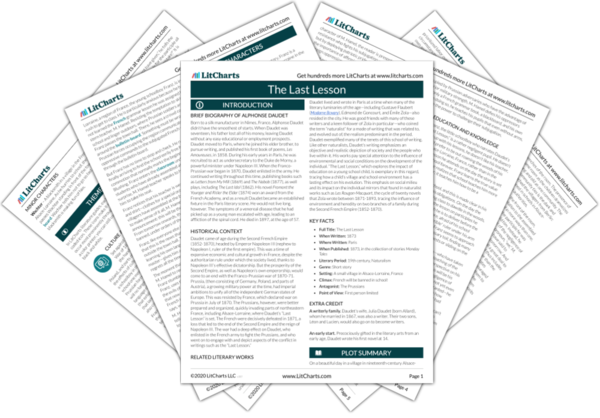The French language is a symbol of French cultural identity. Franz’s teacher, M. Hamel, lectures the gathered pupils and villagers—who have just received news that Prussian occupiers have banned the teaching of French in the schools of Alsace-Lorraine—on the beauty of the French language, telling them that it is the clearest and most logical in the world. As M. Hamel himself argues, the French language is the key to French identity—so long as the villagers hold onto their language, then they can also hold onto their identity, and thus to their freedom, even in the face of foreign occupation. As such, the language is not only an embodiment of the villagers’ French identity, it is also the key to their liberation.
French Quotes in The Last Lesson
[…] M. Hamel mounted his chair, and in the same grave and gentle tone which he had used to me, said, “My children, this is the last lesson I shall give you. The order has come from Berlin to teach only German in the schools of Alsace and Lorraine. The new master comes tomorrow. This is your last French lesson. I want you to be very attentive.”
My last French lesson! Why, I hardly knew how to write! I should never learn any more! I must stop there, then! Oh, how sorry I was for not learning my lessons, for seeking birds’ eggs, or going sliding on the Saar! My books, that had seemed such a nuisance a while ago, so heavy to carry, my grammar, and my history of the saints, were old friends now that I couldn’t give up. And M. Hamel, too; the idea that he was going away, that I should never see him again, made me forget all about his ruler and how cranky he was.
“I won’t scold you, little Franz; you must feel bad enough. See how it is! Every day we have said to ourselves, ‘Bah! I’ve plenty of time. I’ll learn it tomorrow.’ And now you see where we’ve come out. Ah, that’s the great trouble with Alsace; she puts off learning till tomorrow. Now those fellows out there will have the right to say to you, ‘How is it; you pretend to be Frenchmen, and yet you can neither speak nor write your own language?’”
“Your parents were not anxious enough to have you learn. They preferred to put you to work on a farm or at the mills, so as to have a little more money. And I? I’ve been to blame also. Have I not often sent you to water my flowers instead of learning your lessons? And when I wanted to go fishing, did I not just give you a holiday?”
[…] M. Hamel went on to talk of the French language, saying that it was the most beautiful language in the world—the clearest, the most logical; that we must guard it among us and never forget it, because when a people are enslaved, as long as they hold fast to their language it is as if they had the key to their prison.
After the grammar, we had a lesson in writing. That day M. Hamel had new copies for us, written in a beautiful round hand—France, Alsace, France, Alsace. They looked like little flags floating everywhere in the school-room, hung from the rod at the top of our desks.
After the writing, we had a lesson in history, and then the babies chanted their ba, be bi, bo, bu. Down there at the back of the room old Hauser had put on his spectacles and, holding his primer in both hands, spelled the letters with them. You could see that he, too, was crying; his voice trembled with emotion, and it was so funny to hear him that we all wanted to laugh and cry.












